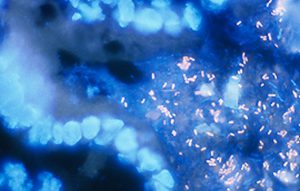
Breastfeeding
Infants in industrialized nations are losing a species of gut bacteria that digests breast milk.
Because no other bacteria are as adept at digesting milk, researchers are concerned this bacterial exodus could mean rising cases of conditions common in the industrialized world, such as chronic inflammation.
For infants who are breastfed, their health is off to a solid start with milk that provides nutrients for good bacteria that fight off pathogens.
A new study found that bacteria in the genus Bifidobacterium are the most prevalent species in the microbiome of infants less than 6 months old around the world, regardless of whether they are fed breast milk or formula.
A species called Bifidobacterium infantis (or B. infantis) is known to efficiently break down the oligosaccharides, a special class of breast milk sugars, as well as boost the immune system and bacterial microbiome development.
Researchers discovered that a species called Bifidobacterium infantis (or B. infantis) dominates the gut microbiome of infants in nonindustrialized societies.
In contrast, Bifidobacterium breve, a species with limited capacity to break down milk sugars, is the most prevalent species in infants of industrialized nations.
The new research, published in the journal Science June 10, found that although breastfeeding increased the quantity of efficient bacteria species in industrialized nations, it remained much lower than in nonindustrialized nations.
Researchers speculate that in the absence of B. infantis, breast milk may have a limited capacity to exert all the benefits to the infant, both in microbiome development and the health of the infant.
“The extraordinary property of the gut microbiome is that it’s malleable,” said the study’s senior author, Justin Sonnenburg, PhD, a professor of microbiology and immunology.

Flora intestinale
“Because of this malleability, the gut microbiome can deteriorate. This is basically what has happened in industrialized nations over the past century.”
The researchers used 62 fecal samples collected over a year to study the infant gut microbes of the Hadza, a hunter-gatherer people in Tanzania, comparing them with those of 17 other populations around the world — including communities in Africa, Asia, North and South America, and Europe — using DNA sequencing, a method that profiles individual species from a sample.
The Hadza of Tanzania, one of the last remaining full-time hunter-gatherer groups, have one of the least industrialized lifestyles in the world.
The plentiful gut microbiomes of nonindustrialized people are crucial to understanding the true capacity of the gut, but they are understudied, Sonnenburg said.
Several factors have led to a low gut diversity in industrialized nations: cesarean sections; antibiotics; sanitation; and a diet higher in saturated fats, low in dietary fiber, and high in artificial sweeteners and emulsifiers, according to Sonnenburg.
C-sections, which prevent the sharing of important vaginal bacteria and baby formula go hand in hand with altering gut microbiome assembly early in life, he added.
There are greater than 100 times the amount of microbial genes in the human microbiome than human genes in the human genome: roughly 2 to 10 million genes.
Because of the large number, the researchers used deep metagenomic sequencing to study the genomes of species within the microbial community, a method that provides insight into the functional capacity of all microorganisms.
The sequencing yielded a diversity not seen in industrialized nations: 23.4% of microbial species detected in the Hadza infants were novel species not found in the Unified Human Gastrointestinal Genome, a catalog of all bacteria that have been detected in the human gut microbiota.
“We have unlocked this reserve of gut diversity data that will forever change how we understand infant gut bacteria and their role in the human microbiome,” said Matthew Olm, the lead author of the study and a postdoctoral scholar in Sonnenburg’s lab.
The novelty provides foundational information for studying the functions that are central to infant gut microbiome development, including the functions that are being lost in industrialized populations.
The team is particularly interested in the milk-digesting genes of the Bifidobacterium because their absence could have long-term immune consequences.
Milk sugars, called human milk oligosaccharides, feed and recruit beneficial bacteria, specifically B. infantis, which is the foundational species for building out the healthy gut microbiome of infants.
Many complications common in the industrialized world, such as allergies and asthma, are thought to result from microbiome imbalances, according to Sonnenburg.
The prevalence of one species over another may, in part, determine the trajectory of health for an infant.
Sonnenburg said that cataloging the variation in the gut microbiomes of humans around the world could help clinicians diagnose the cause of a disease and tweak a patient’s microbiome to ameliorate symptoms — what he calls precision health.
“If you change the gut microbiome, the changes ripple through the human body,” Sonnenburg said.
“The same connections between the gut microbiome and all sorts of chronic inflammatory diseases — ranging from metabolic syndrome to heart disease to different types of cancer to autoimmune disease — also offer the potential to leverage these connections for precision health and ultimately disease prevention.”
The impact on the immune system of a lower amount of B. infantis, which infants often inherit from their mothers during childbirth and through breast milk, is largely unknown.
Still, a University of Nebraska study suggests that a lack of B. infantis results in systemic inflammation and immune dysregulation early in life.
Sonnenburg is a member of Stanford Bio-X and of the Wu Tsai Human Performance Alliance.
Researchers from the Chan-Zuckerberg Biohub, UC Berkeley and New York University Abu Dhabi contributed to this study.
See also
La flora batterica intestinale dei neonati allattati al seno è cambiata
13 giugno 2018
Link…
La flora batterica della mamma arricchisce anche il suo latte (11/01/2016)
Link…
Microbiota network and mathematic microbe mutualism in colostrum and mature milk collected in two different geographic areas: Italy versus Burundi
Link…
For more information
Science
Robust variation in infant gut microbiome assembly across a spectrum of lifestyles
Link…
Cell
Bifidobacteria-mediated immune system imprinting early in life
Link…
Science Transaltional Medicine
Bifidobacterium infantis treatment promotes weight gain in Bangladeshi infants with severe acute malnutrition
Link…
Stanford Medicine
Link…
MDN
This post is also available in:
 Italian
Italian


